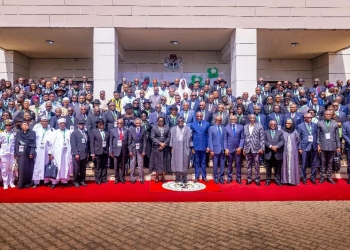RAFAH, Gaza Strip (AP) — Israel has vowed to keep fighting in Gaza until it crushes Hamas after one of the deadliest single battles of the war for its soldiers, even as it faces mounting international calls for a cease-fire and unease on the part of its closest ally, the United States.
The ambush in Gaza City showed Hamas is still able to fight in some of the hardest-hit areas more than two and a half months into a massive air and ground war aimed at destroying its military capabilities. Israel has imposed a total siege on northern Gaza and flattened much of it, forcing most of the population to flee south several weeks ago.
Hamas’ resilience has called into question whether Israel can defeat it without wiping out Gaza. Support for Hamas has surged among Palestinians — in part because of the militant group’s stiff resistance to a far more powerful foe — while Israel’s most important ally, the U.S., has expressed growing discomfort over civilian deaths in what is already one of the 21st century’s most devastating military campaigns.
“We are continuing until the end, there is no question,” Prime Minister Benjamin Netanyahu said late Wednesday. “I say this even given the great pain and the international pressure. Nothing will stop us.”
U.S. National Security Adviser Jake Sullivan was set to visit Israel on Thursday. The U.S. has pressed Israel to take greater measures to spare civilians, and President Joe Biden said earlier this week that Israel was losing international support because of its “indiscriminate bombing.”
The ambush took place Tuesday in the dense Gaza City neighborhood of Shijaiyah, which was also the scene of a major battle during the 2014 war between Israel and Hamas. The dead included two high-ranking officers. A total of 116 soldiers have been killed in the ground offensive, which began Oct. 27.
Heavy fighting has raged for days in Shijaiyah and other areas in and around eastern Gaza City that were encircled earlier in the war. Tens of thousands of people remain in the north despite repeated evacuation orders, saying they don’t feel safe anywhere in Gaza or fear they may never return to their homes if they leave them.
A HEAVY CIVILIAN TOLL
Israel’s air and ground assault, launched in response to Hamas’ unprecedented attack into southern Israel on Oct. 7, has killed more than 18,600 Palestinians, according to the Health Ministry in Hamas-run Gaza.
The ministry does not differentiate between civilian and combatant deaths. Its latest count did not specify how many were women and minors, but they have consistently made up around two-thirds of the dead in previous tallies. Thousands more are missing and feared dead beneath the rubble.
Nearly 1.9 million Palestinians have been driven from their homes, with most seeking refuge in the south, even as Israel has continued to strike what it says are militant targets in all parts of the territory, often killing women and children.
Residents reported Israeli airstrikes overnight in Rafah, the southernmost town along the Egyptian border. An Associated Press reporter saw 27 bodies brought into a local hospital early Thursday.
One woman burst into tears after recognizing the body of her child.
“They were young people, children, displaced, all sitting at home,” Mervat Ashour said as she and others mourned their relatives. “There were no resistance fighters, rockets, or anything.”
A neighbor who helped pull bodies from the rubble of one strike said there were no survivors. “We saw people in pieces,” Hassan Abdulaal said.
New evacuation orders issued as troops pushed into the southern city of Khan Younis earlier this month have pushed U.N.-run shelters to the breaking point and forced people to set up tent camps in even less hospitable areas. Heavy rain and cold in recent days has compounded their misery, swamping tents and forcing families to crowd around fires to keep warm.
Israel has sealed Gaza off to all but a trickle of humanitarian aid, and U.N. agencies have struggled to distribute it since the offensive expanded to the south because of fighting and road closures. Almost no aid has reached the north since the start of the war.
(AP)











